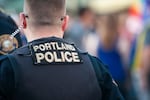
A Portland police officer photographed in 2016.
Bryan M. Vance / OPB
U.S. Department of Justice lawyers sent Portland city officials requested bodycam policies the DOJ would like to see implemented. The policies include requiring all uniformed patrol officers, sergeants and any sworn officer working crowd control or on the Special Emergency Reaction Team to wear a camera.
After months of protests and thousands of use of force incidents in the summer of 2020, the city fell out of compliance with its nine-year-old DOJ settlement agreement. Earlier this year, the Justice Department proposed a list of fixes to bring the city back into compliance, among them body worn cameras. With Monday’s letter, that remedy came into sharper focus and its contours threaten to lodge the city between two powerful groups — the DOJ and the city’s police union — which so far have not found much common ground.
“When an officer uses force, the officer shall not review any BWC recordings before reporting the force ... and completing all other reports associated with the same incident,” the DOJ letter recommends. “After completing their required reports, a member may review any BWC recording associated with the incident and prepare separate supplemental reports with additional information.”
The Justice Department’s requested policies treat deadly use of force differently, saying involved officers shouldn’t be allowed to view camera footage until they are interviewed by investigators and have approval from prosecutors.
The letter also requests policies requiring cameras to automatically activate when an officer draws a firearm or taser and if an officer starts a vehicle pursuit. Officers should also activate their cameras when dispatched to a call for service or when interacting with a member of the public based on probable cause, according the DOJ.
DOJ’s recommendations come as the city is negotiating on multiple fronts over how to hold Portland police accountable going forward. Body worn cameras have been a contentious topic in the ongoing police union contract negotiations, where the Portland Police Association has proposed allowing officers to review footage before writing reports, giving statements or testifying, a common — although controversial — aspect of many cities’ body camera programs. Under the union proposal, the police association would be the only organization outside the police bureau freely allowed to review footage.
Last week, after weeks of negotiation on DOJ’s proposals to bring the city into compliance with the settlement agreement, the federal judge overseeing it ordered the city, Department of Justice, police union, and two community groups involved in the settlement agreement to take another swing at reaching consensus on body camera policies.
Portland Police Association president Sgt. Aaron Schmautz said he didn’t want to get into policy specifics since they are still in closed door contract negotiations, but said the union respectfully disagrees with federal prosecutors’ proposals.
“We’re just looking to get to what we believe is best practice based on all the myriad studies that have been done ... and consistent with all these other large agencies around the country,” he said. “We view video as a tool to make sure that our officers have all the equipment and information available to them to fully and comprehensively cover what happens in an event. Video is one of those tools.”
Research has found that body cameras are effective at improving relationships and trust with the community only when there is transparency. Absent that, they do little to assuage a skeptical public’s concerns about police misconduct, use of force and accountability.
The Police Executive Research Forum, a nonprofit police policy organization made up of police leadership from across the country, recommends policies in line with what the police union is requesting.
But those best practices may be changing. The Department of Justice recommendations to Portland leaders draw from policies already in place in Atlanta and Baltimore, where restrictions exist on when officers can view their footage after using force. Recordings in those cities are also subject to disclosure under the states’ public records laws.
The letter to the city encouraged it to write policies based on input from the public, saying that input should be collected as soon as possible.
Portland City Council is scheduled to vote Wednesday on the fall changes to the budget which includes funding for body worn cameras.
